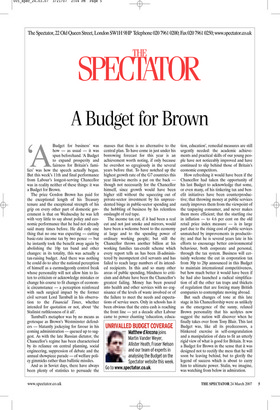A Budget for Brown
‘A Budget for business’ was how — as usual — it was spun beforehand. ‘A Budget to expand prosperity and fairness for Britain’s families’ was how the speech actually began. But this week’s 11th and final performance from Labour’s longest-serving Chancellor was in reality neither of these things: it was a Budget for Brown.
The price Gordon Brown has paid for the exceptional length of his Treasury tenure and the exceptional strength of his grip on every other part of domestic government is that on Wednesday he was left with very little to say about policy and economic performance that he had not already said many times before. He did only one thing that no one was expecting — cutting basic-rate income tax by two pence — but he instantly took the benefit away again by abolishing the 10p tax band and other changes: in its totality, this was actually a tax-raising budget. And there was nothing he could do to alter the national perception of himself as a curmudgeonly control freak whose personality will not allow him to listen to criticism or acknowledge mistakes or change his course to fit changes of economic circumstance — a perception reinforced with such surgical impact by the former civil servant Lord Turnbull in his observation to the Financial Times, whether intended for quotation or not, about ‘the Stalinist ruthlessness of it all’.
Turnbull’s metaphor was by no means as grotesque as Brown’s Westminster defenders — blatantly jockeying for favour in his coming administration — queued up to suggest. As with the late Russian dictator, the Chancellor’s regime has been characterised by its reliance on central planning, social engineering, suppression of debate and the annual showpiece parade — of welfare policy gimmicks rather than ballistic missiles.
And as in Soviet days, there have always been plenty of statistics to persuade the masses that there is no alternative to the central plan. To have come in just under his borrowing forecast for this year is an achievement worth noting, if only because he overshot so egregiously in the several years before that. To have notched up the highest growth rate of the G7 countries this year likewise merits a pat on the back though not necessarily for the Chancellor himself, since growth would have been higher still without the squeezing out of private-sector investment by his unprecedented binge in public-sector spending and the hobbling of business by his relentless onslaught of red tape.
The income tax cut, if it had been a real cut and not just smoke and mirrors, would have been a welcome boost to the economy at large and to the spending power of ordinary working people; but still the Chancellor throws another billion at his working families tax-credit scheme which every report tells us has been ill-administered by incompetent civil servants and has failed to reach large numbers of its intended recipients. In this and so many other areas of public spending, blindness to criticism and debate have been the Chancellor’s greatest failing. Money has been poured into health and other services with no cognisance of the levels of waste involved or of the failure to meet the needs and expectations of service users. Only in schools has it been obvious that the extra cash is reaching the front line — yet a decade after Labour came to power chanting ‘education, educa tion, education’, remedial measures are still urgently needed: the academic achievements and practical skills of our young people have not noticeably improved and have continued to slip behind those of Britain’s economic competitors.
How refreshing it would have been if the Chancellor had taken the opportunity of his last Budget to acknowledge that some, or even many, of his tinkering tax and benefit initiatives have been counterproductive; that throwing money at public services rarely improves them from the viewpoint of the taxpaying consumer, and never makes them more efficient; that the startling rise in inflation — to 4.6 per cent on the old retail price index measure — is in large part due to the rising cost of public services unmatched by improvements in productivity; and that he is several years late in his efforts to encourage better environmental behaviour, both corporate and personal, through the tax system. Business will certainly welcome the cut in corporation tax from 30p to 28p announced in this Budget to maintain international competitiveness, but how much better it would have been if he had also launched a radical simplification of all the other tax traps and thickets of regulation that are forcing many British companies to contemplate moving abroad.
But such changes of tone at this late stage in his Chancellorship were as unlikely as the emergence of the sunny, relaxed Brown personality that his acolytes now suggest the nation will discover when he finally takes over from Tony Blair. This last Budget was, like all its predecessors, a blinkered exercise in self-congratulation and a manipulation of data to fit an utterly rigid view of what is good for Britain. It was a Budget for Brown in the sense that it was designed not to rectify the mess that he will soon be leaving behind, but to glorify the legend of success which is about to carry him to ultimate power. Stalin, we imagine, was watching from below in admiration.


















































































 Previous page
Previous page